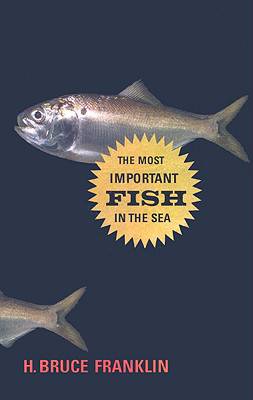
Door een staking bij bpost kan je online bestelling op dit moment iets langer onderweg zijn dan voorzien. Dringend iets nodig? Onze winkels ontvangen jou met open armen!
- Afhalen na 1 uur in een winkel met voorraad
- Gratis thuislevering in België vanaf € 30
- Ruim aanbod met 7 miljoen producten
Door een staking bij bpost kan je online bestelling op dit moment iets langer onderweg zijn dan voorzien. Dringend iets nodig? Onze winkels ontvangen jou met open armen!
- Afhalen na 1 uur in een winkel met voorraad
- Gratis thuislevering in België vanaf € 30
- Ruim aanbod met 7 miljoen producten
Zoeken
€ 43,45
+ 86 punten
Omschrijving
In this brilliant portrait of the oceans' unlikely hero, H. Bruce Franklin shows how menhaden have shaped America's national--and natural--history, and why reckless overfishing now threatens their place in both. Since Native Americans began using menhaden as fertilizer, this amazing fish has greased the wheels of U.S. agriculture and industry. By the mid-1870s, menhaden had replaced whales as a principal source of industrial lubricant, with hundreds of ships and dozens of factories along the eastern seaboard working feverishly to produce fish oil. Since the Civil War, menhaden have provided the largest catch of any American fishery. Today, one company--Omega Protein--has a monopoly on the menhaden "reduction industry." Every year it sweeps billions of fish from the sea, grinds them up, and turns them into animal feed, fertilizer, and oil used in everything from linoleum to health-food supplements. The massive harvest wouldn't be such a problem if menhaden were only good for making lipstick and soap. But they are crucial to the diet of bigger fish and they filter the waters of the Atlantic and Gulf coasts, playing an essential dual role in marine ecology perhaps unmatched anywhere on the planet. As their numbers have plummeted, fish and birds dependent on them have been decimatedand toxic algae have begun to choke our bays and seas. In Franklin's vibrant prose, the decline of a once ubiquitous fish becomes an adventure story, an exploration of the U.S. political economy, a groundbreaking history of America's emerging ecological consciousness, and an inspiring vision of a growing alliance between environmentalists and recreational anglers.
Specificaties
Betrokkenen
- Auteur(s):
- Uitgeverij:
Inhoud
- Aantal bladzijden:
- 280
- Taal:
- Engels
Eigenschappen
- Productcode (EAN):
- 9781597265072
- Verschijningsdatum:
- 1/02/2009
- Uitvoering:
- Paperback
- Formaat:
- Trade paperback (VS)
- Afmetingen:
- 148 mm x 221 mm
- Gewicht:
- 340 g

Alleen bij Standaard Boekhandel
+ 86 punten op je klantenkaart van Standaard Boekhandel
Beoordelingen
We publiceren alleen reviews die voldoen aan de voorwaarden voor reviews. Bekijk onze voorwaarden voor reviews.











